Intro
Find comprehensive Mental Health Center Support, including counseling, therapy, and stress management, to improve emotional well-being and overall mental health through professional guidance and care.
The importance of mental health cannot be overstated, as it plays a significant role in our overall well-being. Mental health issues can affect anyone, regardless of their background, age, or socioeconomic status. Unfortunately, many people struggle with mental health problems, such as anxiety, depression, and trauma, without seeking help due to stigma, lack of resources, or inadequate support systems. Mental health centers provide a safe and non-judgmental space for individuals to receive the support and care they need to manage their mental health.
Mental health centers offer a wide range of services, including counseling, therapy, and medication management. These services are often provided by a team of mental health professionals, including psychiatrists, psychologists, social workers, and counselors. Mental health centers may also offer specialized programs, such as substance abuse treatment, trauma recovery, and support groups for specific mental health conditions. By providing comprehensive and individualized care, mental health centers can help individuals develop coping strategies, improve their mental health, and enhance their overall quality of life.
The benefits of mental health center support are numerous. For instance, mental health centers can provide individuals with a sense of community and connection, which is essential for mental health and well-being. Additionally, mental health centers can offer education and resources on mental health topics, such as stress management, self-care, and mindfulness. By empowering individuals with knowledge and skills, mental health centers can help them take control of their mental health and make positive changes in their lives. Furthermore, mental health centers can provide a safe and supportive environment for individuals to process their emotions, work through challenges, and develop resilience.
Mental Health Center Services
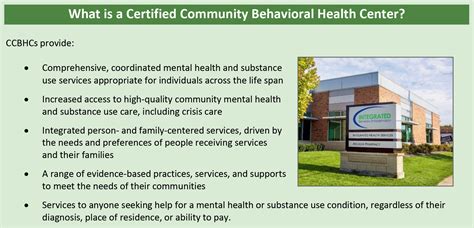
Types of Therapy
Mental health centers may offer various types of therapy, such as cognitive-behavioral therapy (CBT), dialectical behavior therapy (DBT), and psychodynamic therapy. CBT focuses on helping individuals identify and change negative thought patterns and behaviors that contribute to their mental health issues. DBT, on the other hand, emphasizes the development of emotional regulation, distress tolerance, and mindfulness skills. Psychodynamic therapy explores the underlying causes of an individual's mental health issues, such as past experiences and relationships.Mental Health Center Benefits
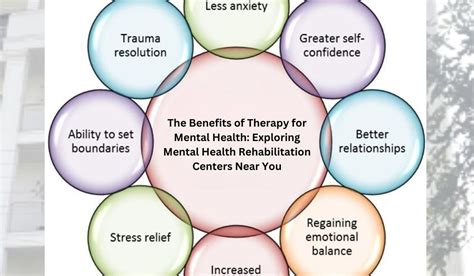
Overcoming Stigma
Mental health centers can help individuals overcome the stigma associated with mental health issues. By providing a safe and non-judgmental space, mental health centers can help individuals feel comfortable seeking help and discussing their mental health concerns. Additionally, mental health centers can offer education and resources on mental health topics, which can help reduce stigma and promote awareness and understanding.Mental Health Center Support for Specific Populations
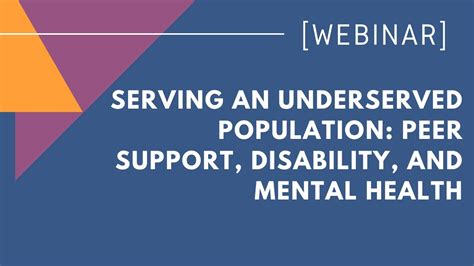
Cultural Competence
Mental health centers should strive to provide culturally competent care, which involves understanding and respecting the cultural backgrounds and values of the individuals they serve. This can include providing services in multiple languages, incorporating cultural practices and traditions into treatment plans, and being sensitive to the unique challenges and experiences of diverse populations.Mental Health Center Resources
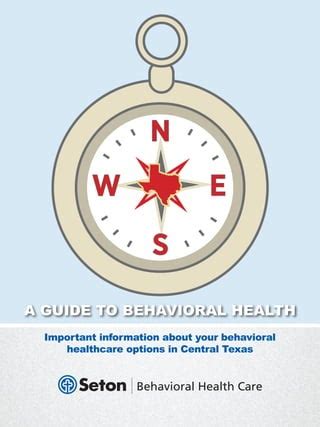
Self-Care
Mental health centers can emphasize the importance of self-care and provide individuals with strategies and techniques to prioritize their mental health and well-being. This can include practices such as mindfulness, meditation, and yoga, as well as activities such as exercise, creative pursuits, and spending time in nature.Mental Health Center Staff
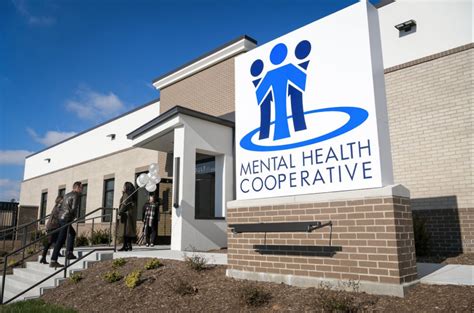
Continuing Education
Mental health center staff should prioritize continuing education and professional development to stay up-to-date on the latest research, treatments, and best practices in mental health care. This can include attending conferences, workshops, and training sessions, as well as participating in peer consultation and supervision.Mental Health Center Locations
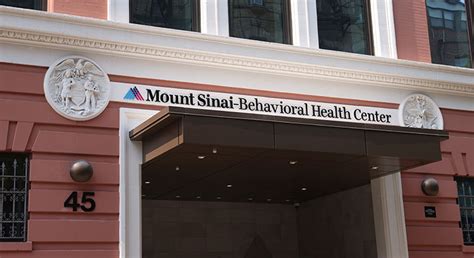
Accessibility
Mental health centers should prioritize accessibility and strive to provide services that are inclusive and welcoming to all individuals, regardless of their background, culture, or socioeconomic status. This can include providing services in multiple languages, offering sliding scale fees, and accommodating individuals with disabilities.Mental Health Center Funding

Advocacy
Mental health centers can play a critical role in advocating for mental health care and promoting awareness and understanding of mental health issues. This can include participating in advocacy campaigns, providing educational materials and resources, and collaborating with other organizations and stakeholders to promote mental health care.What services do mental health centers provide?
+Mental health centers provide a wide range of services, including counseling, therapy, and medication management. These services are often provided by a team of mental health professionals, including psychiatrists, psychologists, social workers, and counselors.
How can I find a mental health center near me?
+You can find a mental health center near you by searching online, checking with your insurance provider, or contacting your local health department. You can also ask for referrals from your primary care physician or other healthcare professionals.
What is the cost of mental health center services?
+The cost of mental health center services can vary depending on the location, services provided, and insurance coverage. Some mental health centers may offer sliding scale fees or accept insurance reimbursement, while others may require private pay.
In conclusion, mental health centers play a critical role in supporting individuals with mental health issues. By providing a safe and non-judgmental space, mental health centers can help individuals develop coping strategies, improve their mental health, and enhance their overall quality of life. If you or someone you know is struggling with mental health issues, consider reaching out to a mental health center for support. Remember, mental health care is essential for overall well-being, and seeking help is a sign of strength, not weakness. We invite you to share your thoughts and experiences with mental health center support in the comments below.
